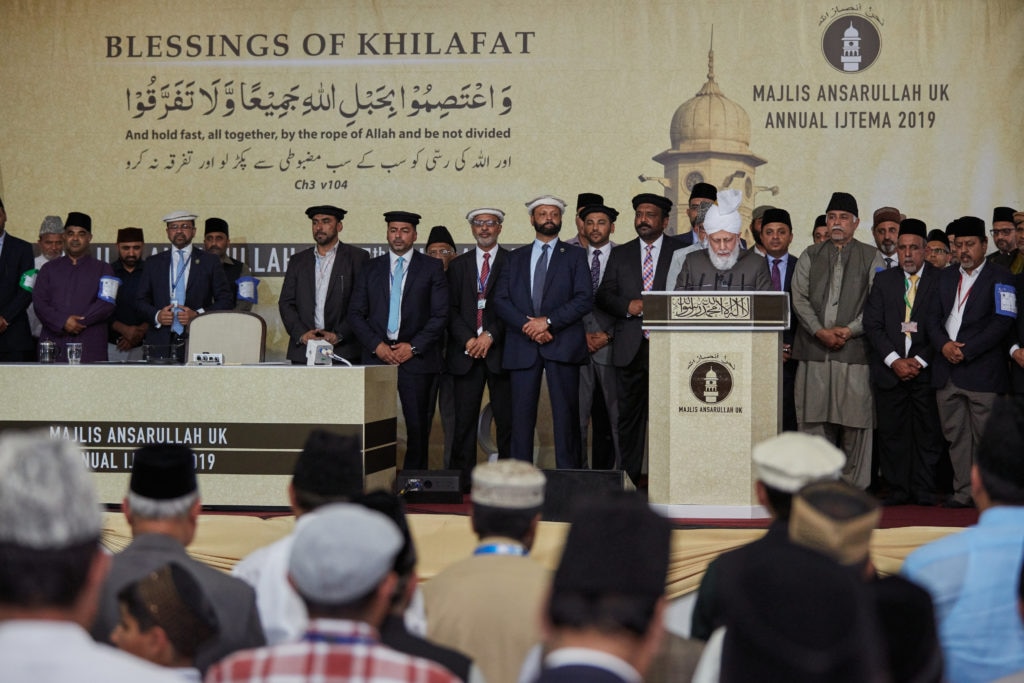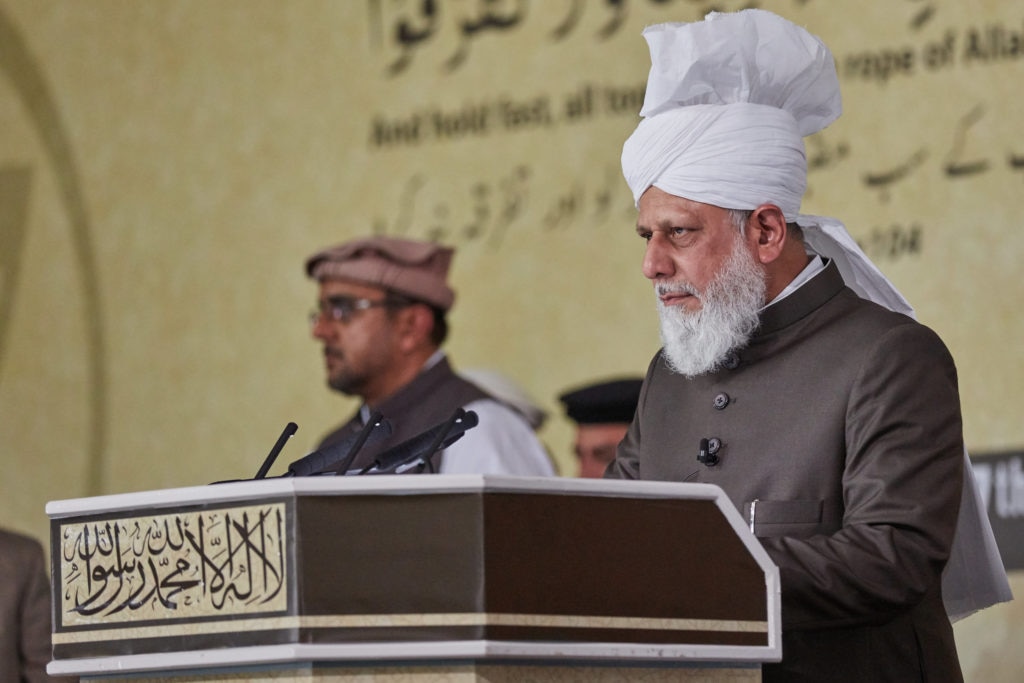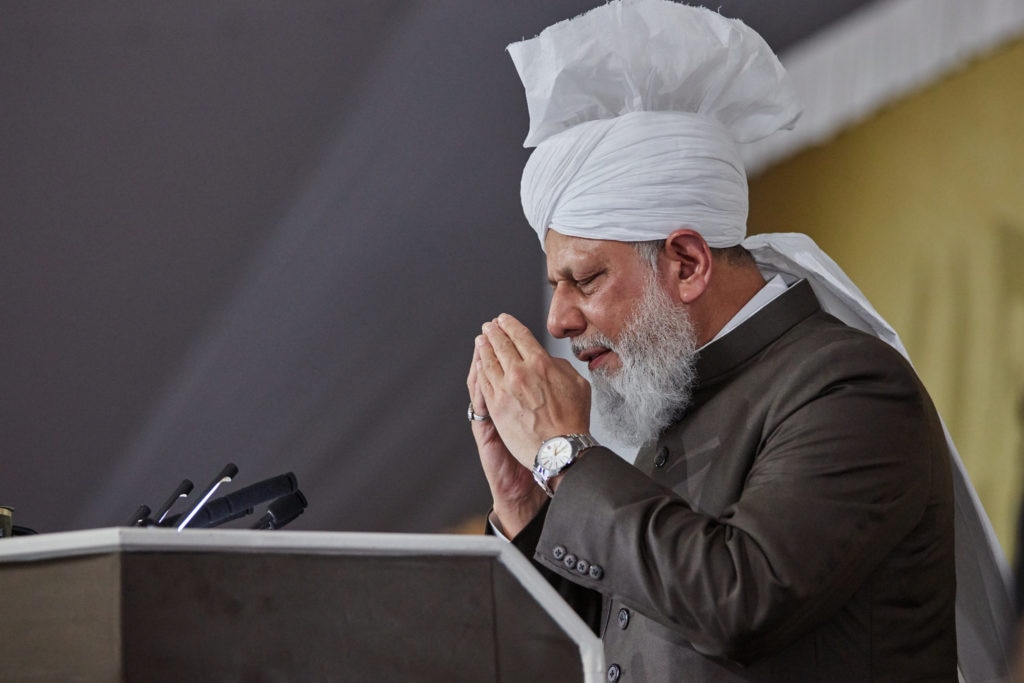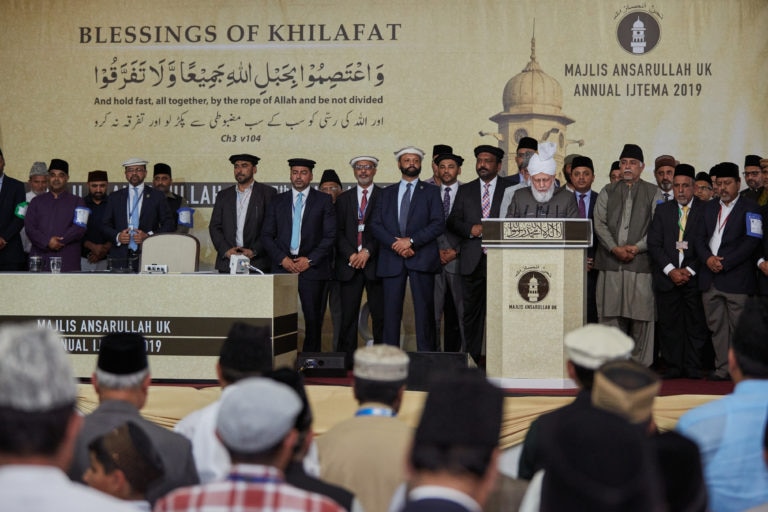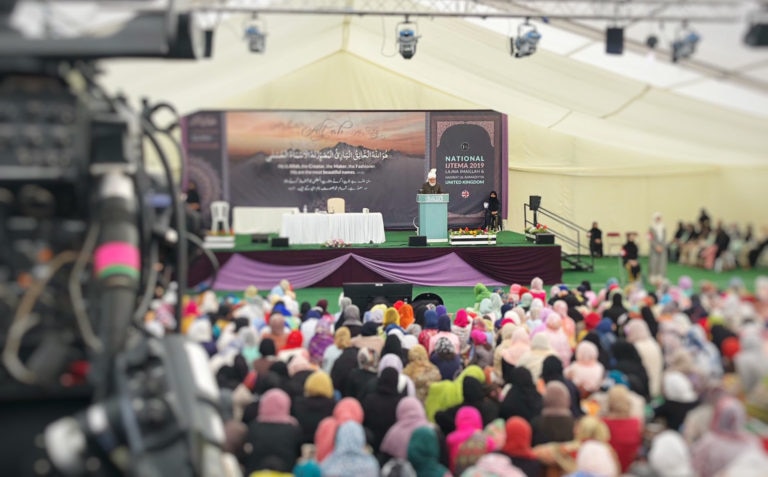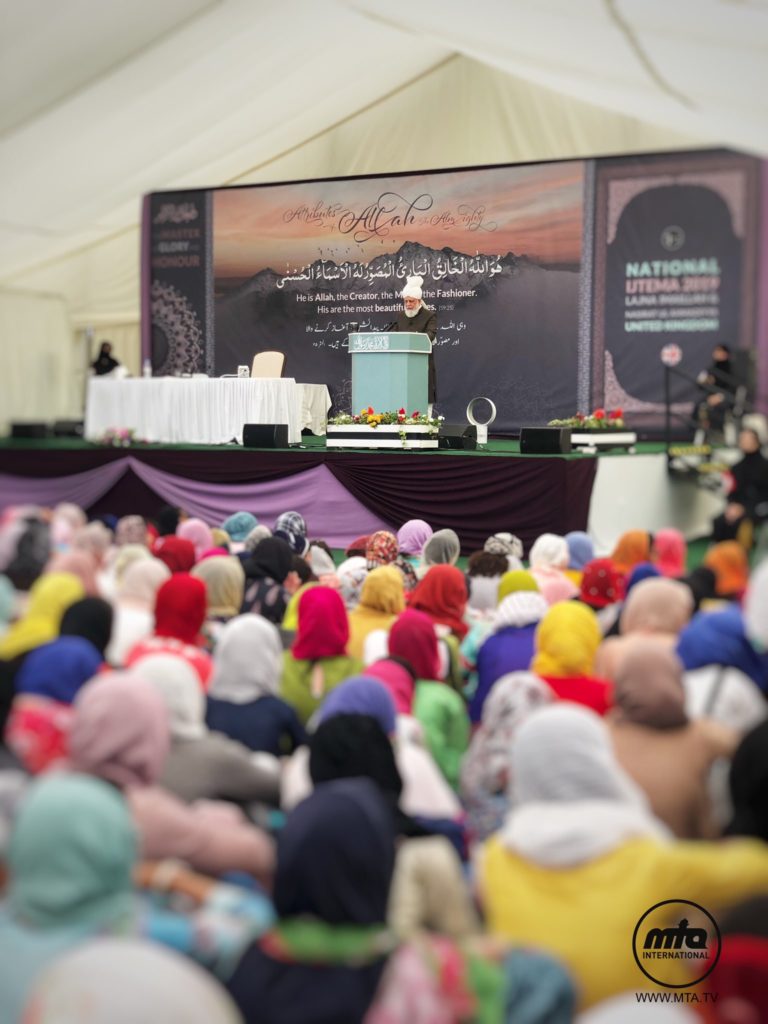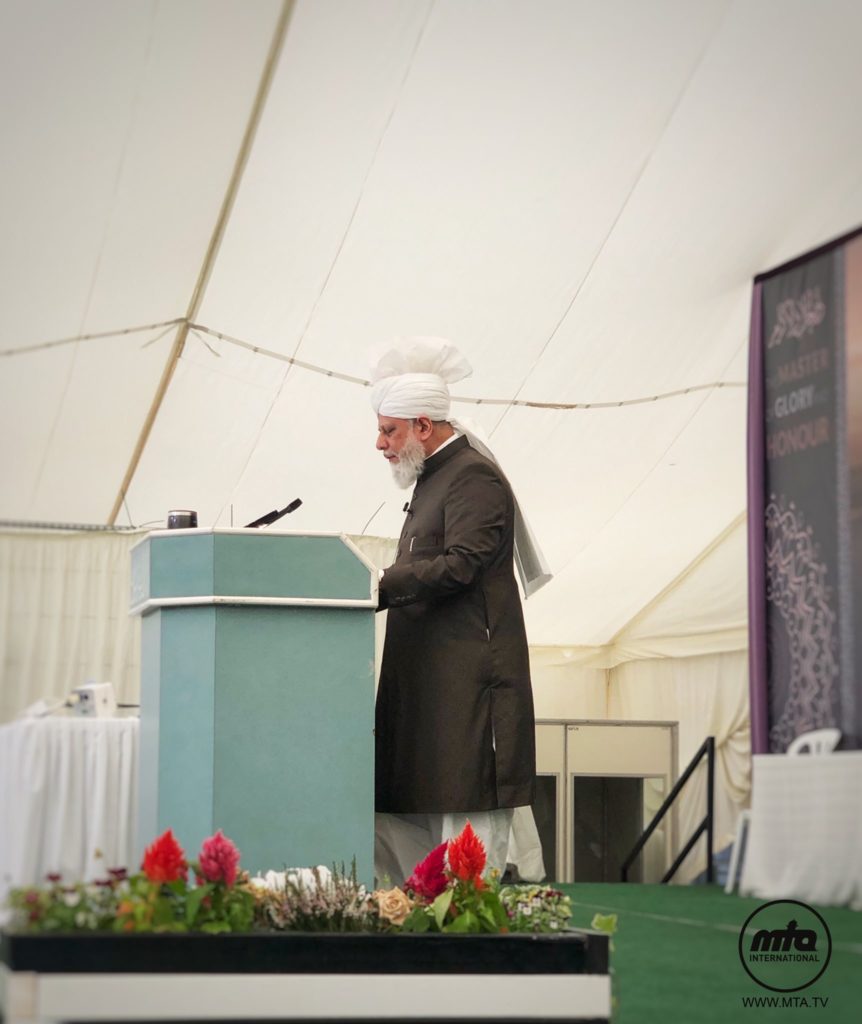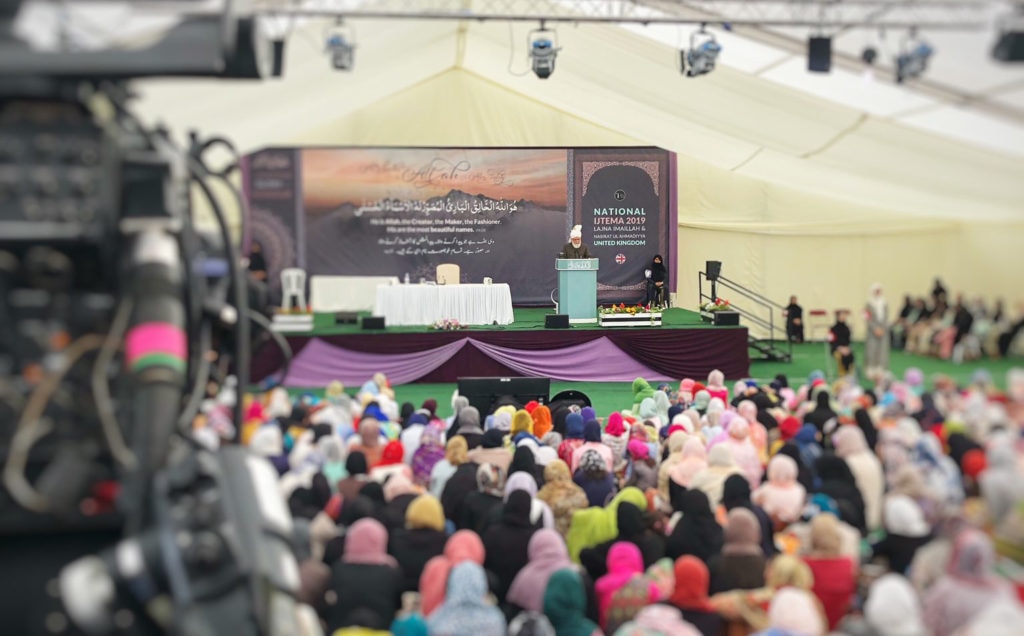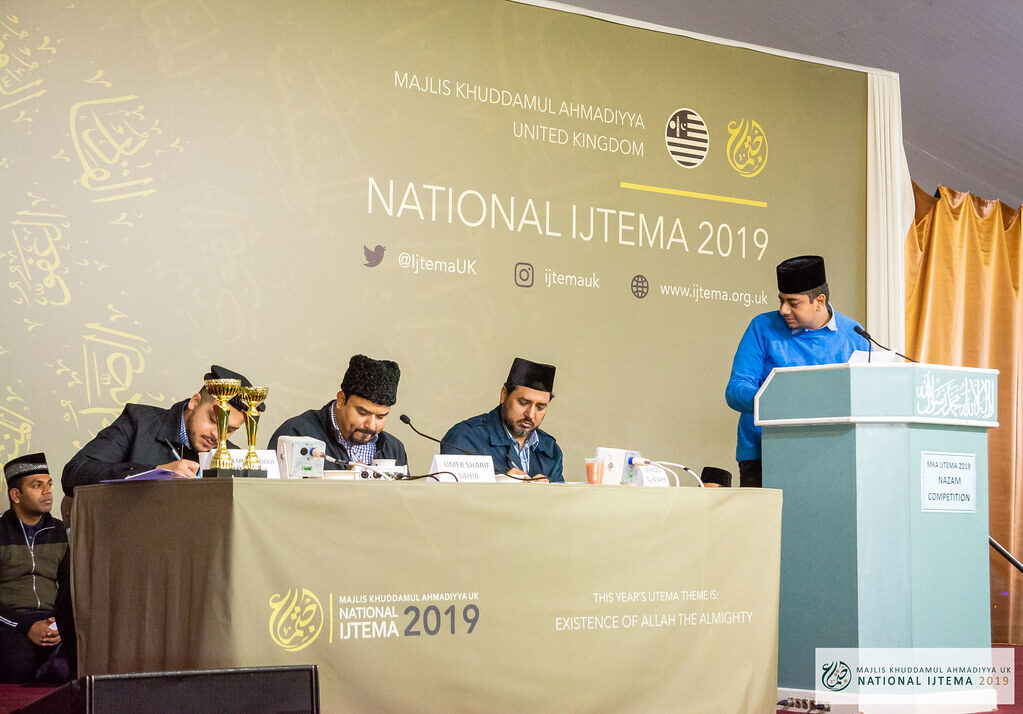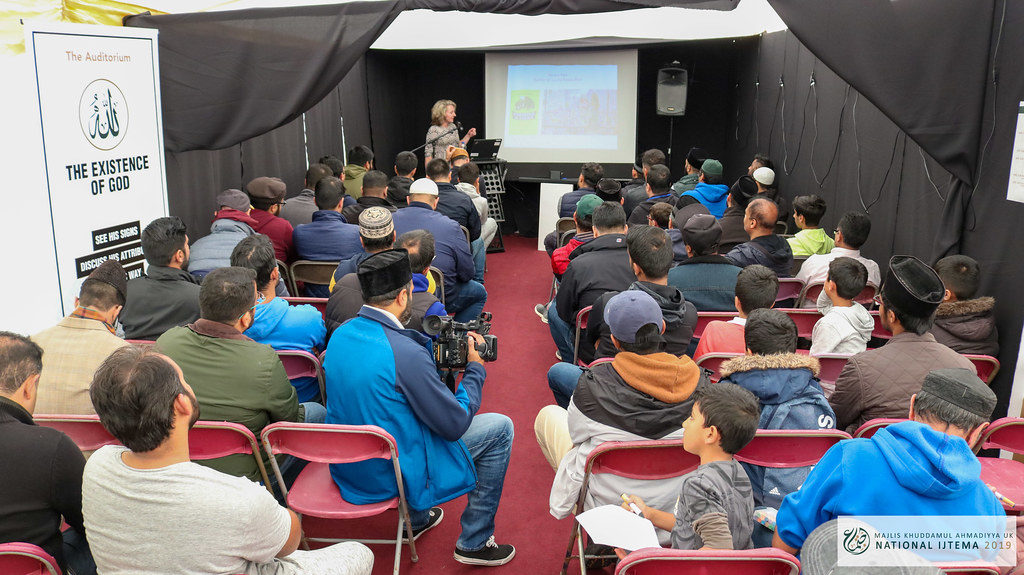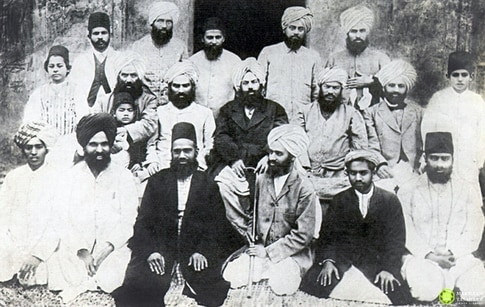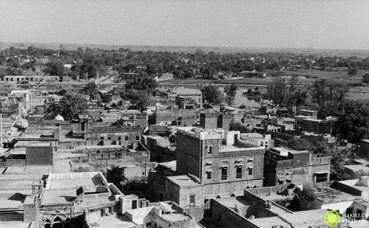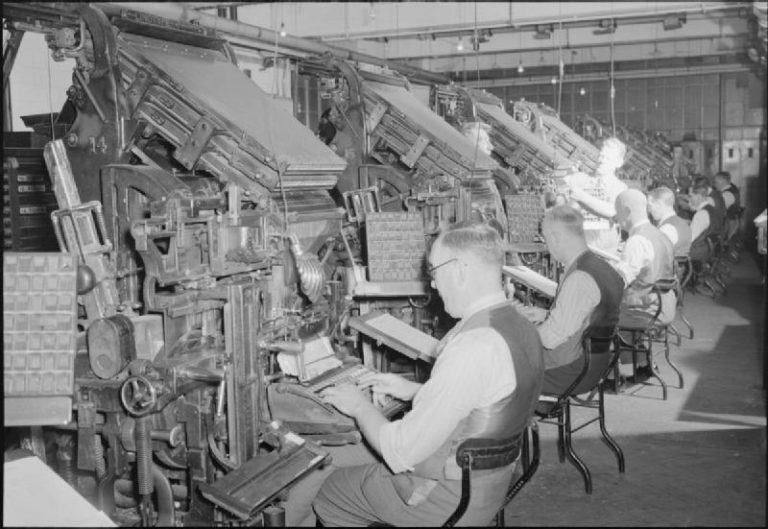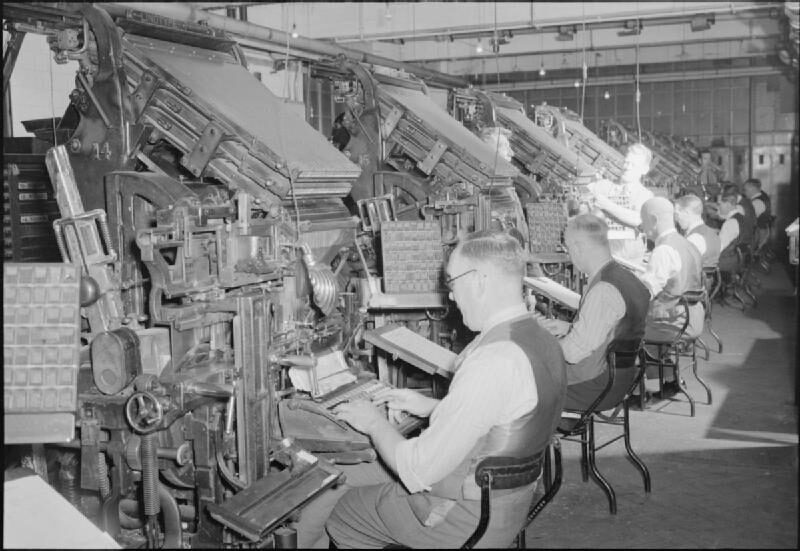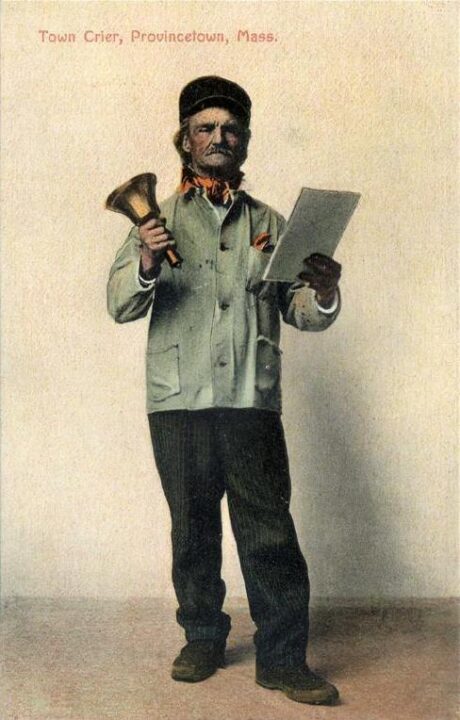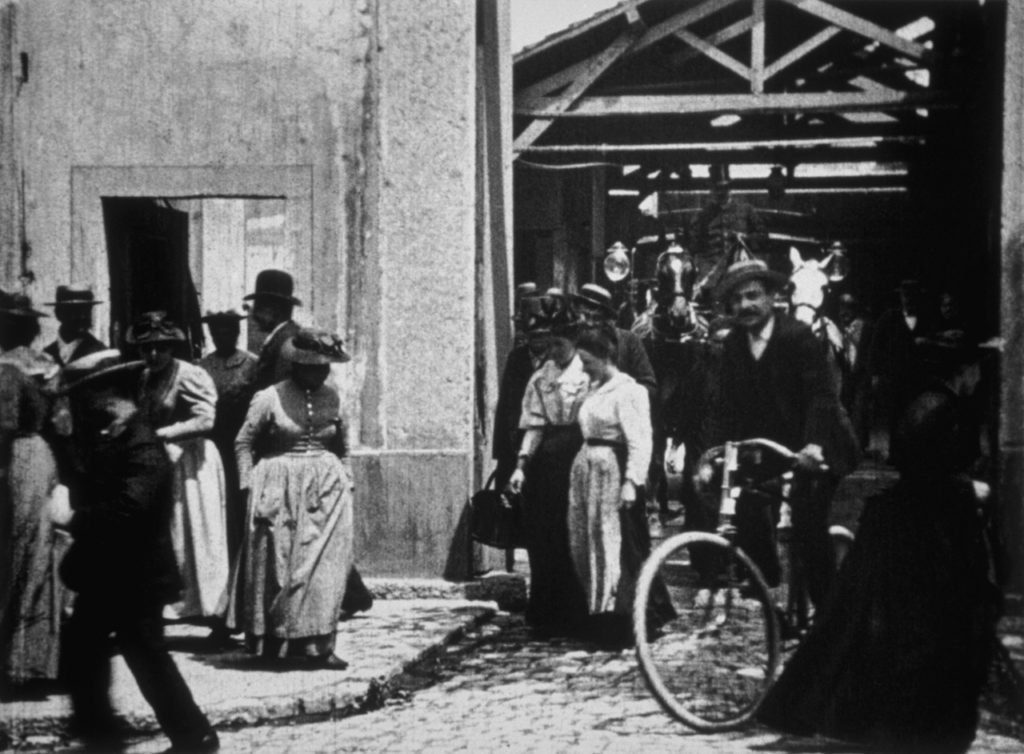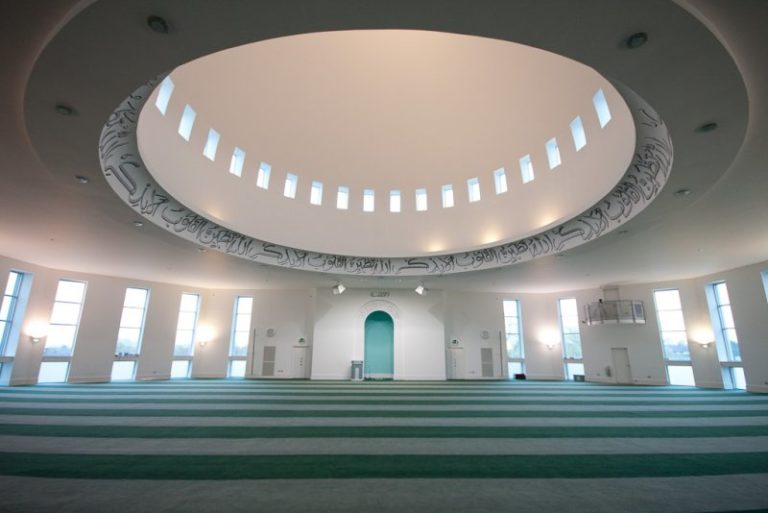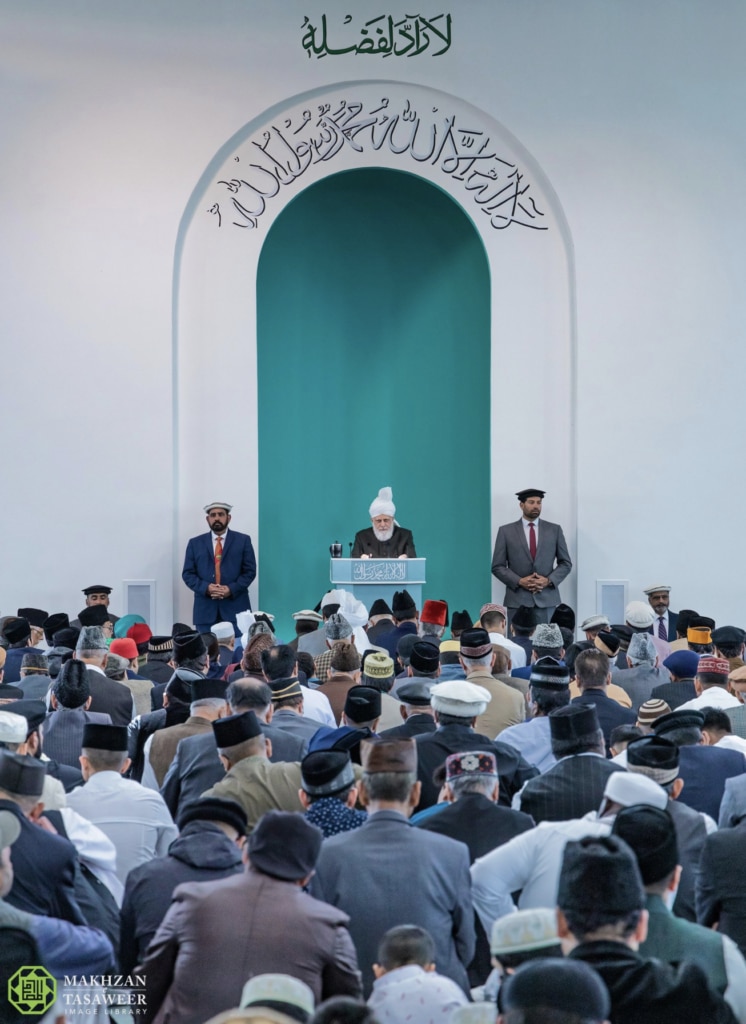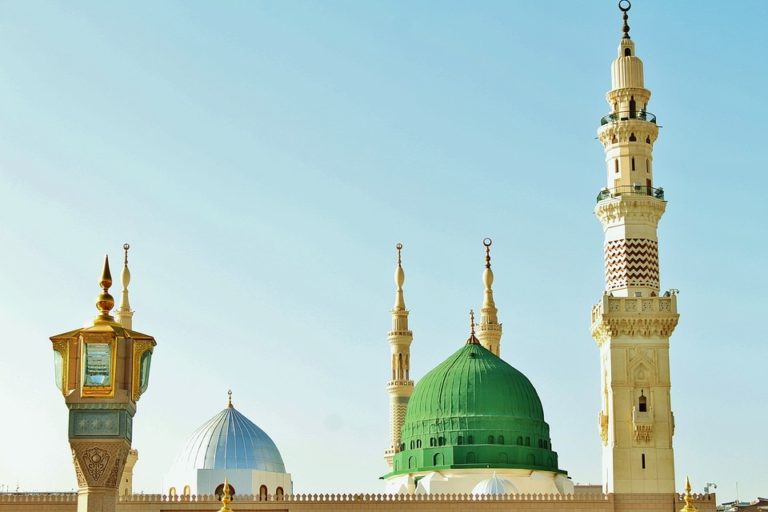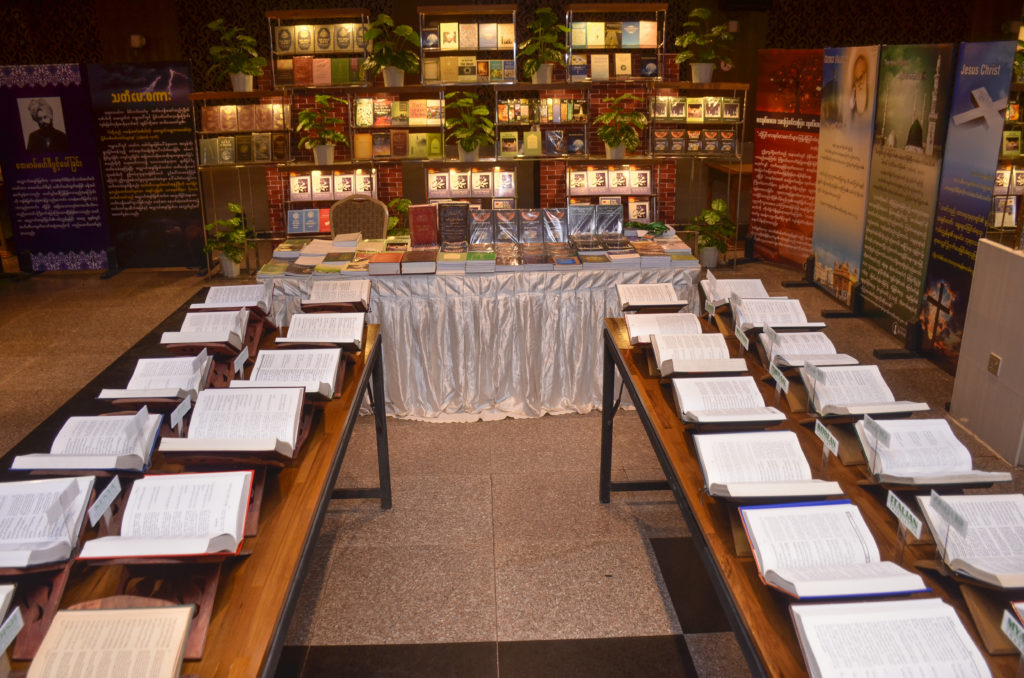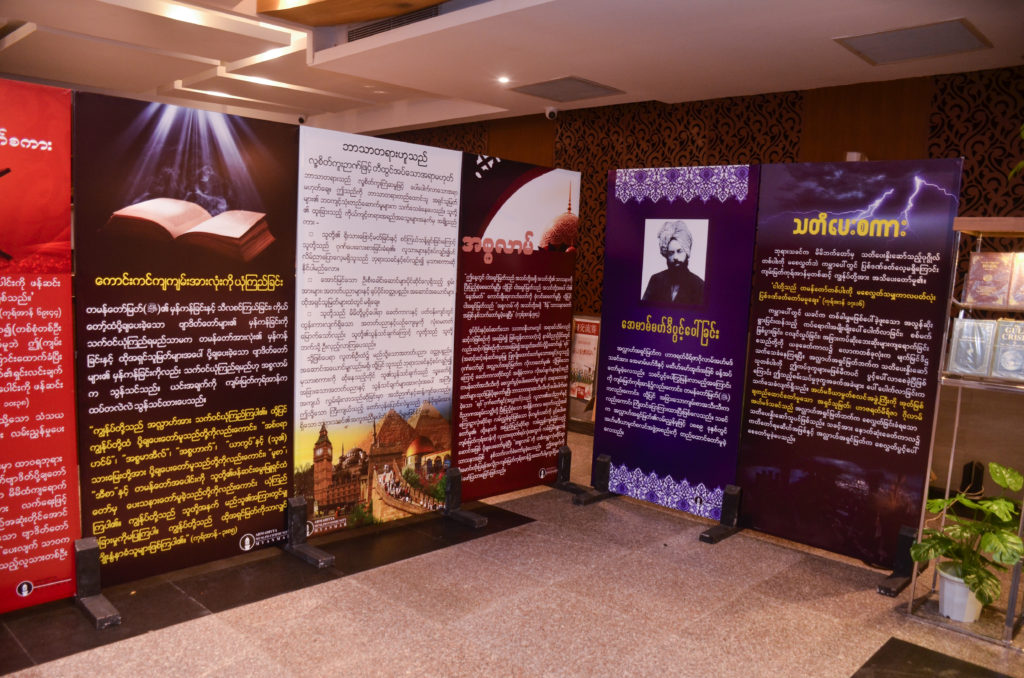Friday Sermon
16 August 2019
Men of Excellence
After reciting Tashahud, Ta‘awuz and Surah al-Fatihah, Hazrat Khalifatul Masih Vaa stated:
Today I
will continue to narrate the accounts of the Badri companions [i.e. those
companions who took part in the Battle of Badr], which have been ongoing for
some time.
The first companion to be mentioned is
Hazrat Qatadahra bin Numan Ansari. Hazrat Qatadahra
belonged to the Banu Zafar clan of the Khazraj tribe of the Ansar. His father
was Numan bin Zaid and his mother was Unaisah bint Qais.
Hazrat Qatadah’sra title is
reported as Abu Umar as well as Abu Amr and Abu Abdillah. Hazrat Qatadahra
was the half-brother of Hazrat Abu Saeed Khudrira; they were both
born to the same mother.
Hazrat Qatadahra had the
opportunity to participate in the Bai‘at-e-Aqabah along with 70 Ansari
companions. However, according to another narration by Allamah Ibn Ishaaq, he was
not part of those Ansari companions who participated in the Bai‘at-e-Aqabah or
perhaps he has simply not mentioned him.
Hazrat Qatadahra was one of the
archers appointed by the Holy Prophetsa. He participated in the
Battles of Badr, Uhud, Khandaq and all the subsequent battles along with the
Holy Prophetsa. Hazrat Qatadah’sra eye was struck by
an arrow during the Battle of Uhud due to which his eye came out of its socket.
He came to the Holy Prophetsa
and said, “O Messengersa of Allah! I have been struck by an arrow
and my eye has come out. I love my wife very much, however if she were to see
me like this, I fear that she may start to resent me.” The Holy Prophetsa
placed the eye back in the socket with his hand and it was set in its place
again and he regained his sight in that eye.
This eye was sharper and stronger than his
other eye even during old age. According to another narration, the Holy Prophetsa
had applied his saliva on that eye as a result of which it became even better
than the other eye. (Al-Tabaqaat-ul-Kubra li ibn Saad, Vol.
3, p. 239, Wa min Bani Zafar…, Dar Ihyaa Al-Turath Al-Arabi, Beirut, 1996) (Usdul
Ghaba, Vol. 4, pp. 370-371, Qatadahra, Dar-ul-Kutub al-Ilmiyyah,
Beirut, 2008)
Hazrat Qatadahra himself has
also mentioned this incident and states, “The Messengersa of Allah
was given a bow as a gift. The Holy Prophetsa gave it to me on the
occasion of Uhud. I shot arrows with it in front of the Holy Prophetsa
until its string broke. Despite this, I remained in front of the blessed face
of the Messengersa of Allah.”
Usually we mention Hazrat Talhara
in this regard but his name is also mentioned. He further states:
“I continued to stand in front of the Holy
Prophetsa. Whenever, an arrow came in the direction of the Messengersa
of Allah, I would move my head in front of it so that I would serve as a shield
for the blessed countenance of the Messengersa of Allah. I did not
have any more arrows left at that point which I could shoot. At that moment, an
arrow struck one of my eyes, due to which my eye came out of its socket and
onto my cheek. Thereafter, the attacking army dispersed and I held my eye in my
own hand and went to the Holy Prophetsa. I was not far from him when
the Messengersa of Allah saw it in my hand, and tears started to
flow from the Holy Prophetsa eyes and prayed, ‘O Allah! Qatadahra
has saved the face of Your Prophet with his own face. Pray, make this eye of
his, the more beautiful and observant of the two.’ Thus, that eye was more beautiful
and the visually more perceptive of the two.” (Al-Mu‘jam
Al-Kabir Li Al-Tabarani, Vol. 19, p. 8, Umar bin Qatadah bin Al-Numan, Dar
Ihyaa Al-Turath Al-Arabi, 2002)
In the tradition which he has narrated
himself, there is no mention of the fact that his wife will not love him
because of this and will begin to resent him. The earlier account which I
related was what the historians have written in order to perhaps arouse more
interest, or perhaps just for the sake of it.
However, in his own narration of the account, there is no mention of his
wife.
Nevertheless, his eye fell out of the
socket during the battle. The Holy Prophetsa placed it back in its
socket and his eyesight was immediately restored. As a matter of fact, it
improved greatly and for this very reason, Hazrat Qatadahra later
became known by the title of Dhul-Ain, that is, the possessor of the eye.
(Al-Isaba Fi Tamyeez Al-Sahaba, Vol. 2, p. 345,
Dar-ul-Kutub al-Ilmiyyah, Beirut, Lebanon, 2005)
Hazrat Qatadahra participated
alongside the Holy Prophetsa in all the battles, including the
Battle of Khandaq [the Ditch].
On the occasion of the Conquest of Mecca,
the flag of the tribe of Banu Zafar was in the hands of Hazrat Qatadahra.
He passed away at the age of 65, in 23 AH. Hazrat Umarra led his
funeral prayer in Medina. His half-brother, Hazrat Abu Saeed Khudrira,
Muhammadra bin Maslama and Harithra bin Khuzma came down
into his grave and according to one narration, Hazrat Umarra was
also among those who came down into the grave [during his burial]. The name of
one of the grandsons of Hazrat Qatadahra was Asim bin Umar, who was
an expert in the field of genealogy – that is the knowledge of families,
ancestries and tribes – and Allama Ibn Ishaaq has related many of his
narrations. (Al-Tabaqaat-ul-Kubra li ibn Saad, Vol. 3, p.
239, Wa min Bani Zafar,…, Dar Ihyaa Al-Turath Al-Arabi, Beirut, 1996) (Usdul
Ghaba, Vol. 4, p. 372, Qatadahra, Dar-ul-Kutub al-Ilmiyyah,
Beirut, 2008) (Siyar Al-Sahabah Az Saeed Ansari, Vol. 3, p. 474, Darul
Ishaat, Karachi, 2004)
In one of the narrations it states that
the Holy Prophetsa had a bow that was called Qutoom. This was made
from Naba, a tree from which arrows are made. This was the bow that broke during
the Battle of Uhud by Hazrat Qatadahra due to its excessive use. (Tarikh
Dimashq Li Ibn Akir, Vol. 4, p. 148, Bab Dhikr Silahah Wa Markubah, Dar
Ihyaa Al-Turath Al-Arabi, 2001) (Lughaat Al-Hadith, Vol. 4, p. 293, Ali
Asif Printers, Lahore, 2005)
Hazrat Qatadahra bin Numan
states that there was a family from among the Ansar, which were known as Banu
Ubairak. There were three brothers, Bishr, Bashir and Mubashir. Bashir was a
hypocrite and a poet and used to ridicule the companions of the Holy Prophetsa
through his poetry. He made out to be a Muslim, but some of his actions were
contradictory to this. He would attribute his statements to some Arabs and say
that such and such a person has said this. When the companions of the Holy
Prophetsa heard the couplets he used to recite, the Companions
stated, “By God! This is the couplet of this very wretched person and these
couplets are those of Ibn Ubairak.” These were needy and impoverished people
during the age of ignorance as well as during the era of Islam and they did not
change their state. They did not do any work nor make any effort. As a result
of this, they were extremely poor.
Furthermore, he states that dates and
barley were the food for the people of Medina. Once a person became wealthy and
a grain merchant would bring some white, finely grounded flour from the region
of Levant, this wealthy individual would purchase some of it and include it in
his food. However, his wife and children would still eat dates and barley.
He says that once, it so happened that
when a grain merchant came from the region of Levant, his paternal uncle,
Rifa‘ah bin Zaid purchased a sack of white flour and placed it in his
storeroom. He had also placed his weapons, armour and sword in that storeroom.
He says that a wrongdoing was committed against him in that this storeroom was
looted. Thieves broke in by breaking the wall and the ration, including the
weapons were stolen. In the morning, his paternal uncle, Rifa‘ah, came to him
and said:
“My dear nephew! I was greatly wronged
last night. Our storeroom was broken into and all of our rations and weapons
were stolen. We have tried to receive some information in the area and have
also asked people. In response we were told that they saw Banu Ubairak this
evening. They had lit a fire and they believe that they were probably
celebrating with our food. That is, they were probably cooking and eating the
items they had stolen.”
Hazrat Qatadahra further states
that while they were conducting an investigation in the neighbourhood, the Banu
Ubairak claimed, “By God! We think that the person who stole from you is Labeed
bin Sahal.” In other words, they blamed someone else. He states that Labeed was
a Muslim and virtuous man from among them. When he heard that the Banu Ubairak
were accusing him of theft, he drew his sword and stated, “Am I a thief? By
God, my sword shall remain between us unless you find out who committed this
theft.”
He became extremely impassioned and sought
to settle the matter at once. The people around him said, “You are not a thief,
put your sword away for we believe you”, and that “you are a very virtuous
man.” However, upon further investigation, there was no doubt that it was the
Banu Ubairak who had committed the theft. He further states that his paternal
uncle stated, “My dear nephew! Perhaps we could have recovered my belongings
had you gone to the Holy Prophetsa and informed him of this
incident.”
Hazrat Qatadahra bin Numan
states that upon hearing this, he went to the Holy Prophetsa and
presented himself before him and informed him by stating: “Someone from among
our own people has carried out this unjust and cruel act. They went to my
paternal uncle, Rifa‘ah bin Zaid’s house and stole his weapons and ration by
secretly breaking into his store. We request that our weapons be returned to
us. As far as the ration and the grain is concerned, we do not need it as
such.”
The Holy Prophetsa stated, “I
will decide on this matter after having sought consultation.” When this news
reached Banu Ubairak, they met with someone from their tribe known as Aseer bin
Urwah. They discussed the matter with him, and a few other men from the local
area also joined together with them and went to the Holy Prophetsa
and stated, “O Messengersa of Allah! Qatadah bin Numan and his
paternal uncle are accusing someone from among us of committing theft without
providing any witnesses or evidence. We are Muslims and good people.”
Qatadah states, “I visited the Holy
Prophetsa and discussed this matter with him. The Holy Prophetsa
said, ‘You have accused a people of theft who have been described as Muslims
and good people, without providing any witnesses and evidence.’”
Qatadahra was a person of
virtuous disposition. He states that after meeting the Holy Prophetsa
and having heard what he said, he returned home and felt that it would have
been better to lose some of his wealth instead of bringing this matter to the
Holy Prophetsa and to have caused the Holy Prophetsa such
discomfort. It would have been better to lose his wealth than to have ever mentioned
this to the Holy Prophetsa. He then states that his paternal uncle
visited him and stated, “My dear nephew! What have you done thus far regarding
this matter?” In response, Hazrat Qatadahra informed him about what
the Holy Prophetsa had said to him. His uncle stated, “Allah is our
Helper.”
Only a short while had passed since this
conversation took place that the following verses of the Holy Quran were
revealed:
اِنَّاۤ اَنۡزَلۡنَاۤ اِلَیۡکَ الۡکِتٰبَ بِالۡحَقِّ لِتَحۡکُمَ بَیۡنَ النَّاسِ بِمَاۤ اَرٰٮکَ اللّٰہُ ؕ وَ لَا تَکُنۡ لِّلۡخَآئِنِیۡنَ خَصِیۡمًا
Meaning, “We have surely sent down to thee
the Book comprising the truth, that thou mayest judge between men by that which
Allah has taught thee. And be not thou a disputer for the faithless.” (Surah
al-Nisa, Ch.4: V.106)
The word لِّلۡخَآئِنِیۡنَ [the faithless] was used here for the Banu Ubairak. It then further stated وَّاسۡتَغۡفِرِاللّٰہَ “And ask forgiveness of Allah.” اِنَّ اللّٰہَ کَانَ غَفُوۡرًا رَّحِیۡمًا “Surely, Allah is Most Forgiving, Merciful.” (Surah al-Nisa, Ch.4: V.107)
Then, Allah the Almighty stated:
وَ لَا تُجَادِلۡ عَنِ الَّذِیۡنَ یَخۡتَانُوۡنَ اَنۡفُسَہُمۡ ؕ اِنَّ اللّٰہَ لَا یُحِبُّ مَنۡ کَانَ خَوَّانًا اَثِیۡمًا۔ یَّسۡتَخۡفُوۡنَ مِنَ النَّاسِ وَ لَا یَسۡتَخۡفُوۡنَ مِنَ اللّٰہِ وَ ہُوَ مَعَہُمۡ اِذۡ یُبَیِّتُوۡنَ مَا لَا یَرۡضٰی مِنَ الۡقَوۡلِ ؕ وَ کَانَ اللّٰہُ بِمَا یَعۡمَلُوۡنَ مُحِیۡطًا۔ ہٰۤاَنۡتُمۡ ہٰۤؤُلَآءِ جٰدَلۡتُمۡ عَنۡہُمۡ فِی الۡحَیٰوۃِ الدُّنۡیَا ۟ فَمَنۡ یُّجَادِلُ اللّٰہَ عَنۡہُمۡ یَوۡمَ الۡقِیٰمَۃِ اَمۡ مَّنۡ یَّکُوۡنُ عَلَیۡہِمۡ وَکِیۡلًا۔ وَ مَنۡ یَّعۡمَلۡ سُوۡٓءًا اَوۡ یَظۡلِمۡ نَفۡسَہٗ ثُمَّ یَسۡتَغۡفِرِ اللّٰہَ یَجِدِ اللّٰہَ غَفُوۡرًا رَّحِیۡمًا
“And plead not on behalf of those who are dishonest to themselves. Surely, Allah loves not one who is perfidious and a great sinner. They seek to hide from men, but they cannot hide from Allah; and He is with them when they spend the night plotting about matters of which He does not approve. And Allah encompasses what they do. Behold! you are they who pleaded for them in the present life. But who will plead with Allah for them on the Day of Resurrection, or who will be a guardian over them? And whoso does evil or wrongs his soul, and then asks forgiveness of Allah, will surely find Allah Most Forgiving, Merciful.” (Surah al-Nisa, Ch.4: V.108-111)
God Almighty then states:
وَ مَنۡ یَّکۡسِبۡ اِثۡمًا فَاِنَّمَا یَکۡسِبُہٗ عَلٰی نَفۡسِہٖ ؕ وَ کَانَ اللّٰہُ عَلِیۡمًا حَکِیۡمًا۔ وَ مَنۡ یَّکۡسِبۡ خَطِیۡٓٮـَٔۃً اَوۡ اِثۡمًا ثُمَّ یَرۡمِ بِہٖ بَرِیۡٓــًٔا فَقَدِ احۡتَمَلَ بُہۡتَانًا وَّ اِثۡمًا مُّبِیۡنًا
“And whoso commits a sin commits it only
against his own soul. And Allah is All-Knowing, Wise. And whoso commits a fault
or a sin, then imputes it to an innocent person, certainly bears the burden of
a calumny and a manifest sin.” (Surah al-Nisa, Ch.4: V.112-113)
Hazrat Qatadahra then says that
this points towards the Banu Ubairak, who said that according to them, Labeed
bin Sahal committed the theft. God Almighty then further states:
وَ لَوۡ لَا فَضۡلُ اللّٰہِ عَلَیۡکَ وَ رَحۡمَتُہٗ لَہَمَّتۡ طَّآئِفَۃٌ مِّنۡہُمۡ اَنۡ یُّضِلُّوۡکَ ؕ وَ مَا یُضِلُّوۡنَ اِلَّاۤ اَنۡفُسَہُمۡ وَ مَا یَضُرُّوۡنَکَ مِنۡ شَیۡءٍ ؕ وَ اَنۡزَلَ اللّٰہُ عَلَیۡکَ الۡکِتٰبَ وَ الۡحِکۡمَۃَ وَ عَلَّمَکَ مَا لَمۡ تَکُنۡ تَعۡلَمُ ؕ وَ کَانَ فَضۡلُ اللّٰہِ عَلَیۡکَ عَظِیۡمًا۔ لَا خَیۡرَ فِیۡ کَثِیۡرٍ مِّنۡ نَّجۡوٰٮہُمۡ اِلَّا مَنۡ اَمَرَ بِصَدَقَۃٍ اَوۡ مَعۡرُوۡفٍ اَوۡ اِصۡلَاحٍۭ بَیۡنَ النَّاسِ ؕ وَ مَنۡ یَّفۡعَلۡ ذٰلِکَ ابۡتِغَآءَ مَرۡضَاتِ اللّٰہِ فَسَوۡفَ نُؤۡتِیۡـہِ اَجۡرًا عَظِیۡمًا
“And but for the grace of Allah upon thee and His mercy, a party of them had resolved to bring about thy ruin. And they ruin none but themselves and they cannot harm thee at all. Allah has sent down to thee the Book and Wisdom and has taught thee what thou knewest not, and great is Allah’s grace on thee. There is no good in many of their conferences except the conferences of such as enjoin charity, or goodness, or the making of peace among men. And whoso does that, seeking the pleasure of Allah, We shall soon bestow on him a great reward.” (Surah al-Nisa, Ch.4: V.114-115)
Nonetheless, these verses could have
various other meanings as well, however they thought that these verses were
revealed about their situation. However, God Almighty disclosed the reality of
the matter to the Holy Prophetsa. The outcome of this was that when
these verses were revealed, the people of Banu Ubairak about whom there was
suspicion of the theft, also thought that these verses were revealed about them
and admitted to their theft. They brought the weapons back to the Holy Prophetsa,
who then returned it to Rifa‘ah, who was the rightful owner.
Hazrat Qatadahra states:
“My uncle was an elderly man and his eye
sight was weak even prior to his acceptance of Islam during the age of
ignorance [jahiliyyah period]. Owing to this, I thought that perhaps my
uncle was weak in his faith.” He thought that although he had accepted Islam
and became a Muslim, he was not firm in his faith. “But when I took the weapons
that had been returned from the thieves, he said to me, ‘O my nephew! I give
these away as Sadaqah [charity] in the way of God Almighty.’ At that time, I
realised and I was convinced that my uncle was firm in his faith, and all the
while I was wrong to doubt his level of faith.”
When these verses of the Holy Quran were
revealed, Bashir, one of the brothers about whom there was doubt that he was a
hypocrite, went to join the idolaters and stayed with Sulafah bint Saad. At
that time, God Almighty revealed the following verses:
وَ مَنۡ یُّشَاقِقِ الرَّسُوۡلَ مِنۡۢ بَعۡدِ مَا تَبَیَّنَ لَہُ الۡہُدٰی وَ یَتَّبِعۡ غَیۡرَ سَبِیۡلِ الۡمُؤۡمِنِیۡنَ نُوَلِّہٖ مَا تَوَلّٰی وَ نُصۡلِہٖ جَہَنَّمَ ؕ وَ سَآءَتۡ مَصِیۡرًا۔ اِنَّ اللّٰہَ لَا یَغۡفِرُ اَنۡ یُّشۡرَکَ بِہٖ وَ یَغۡفِرُ مَا دُوۡنَ ذٰلِکَ لِمَنۡ یَّشَآءُ ؕ وَ مَنۡ یُّشۡرِکۡ بِاللّٰہِ فَقَدۡ ضَلَّ ضَلٰلًۢا بَعِیۡدًا
“And as to him who opposes the Messenger after guidance has become clear to him, and follows a way other than that of the believers, We shall let him pursue the way he is pursuing and shall cast him into Hell; and an evil destination it is. Allah will not forgive that anything be associated with Him as partner, but He will forgive what is short of that to whomsoever He pleases. And whoso associates anything as partner with Allah has indeed strayed far away.” (Surah al-Nisa, Ch. 4: V.116-117)
When Bashir left Islam and went to stay
with Sulafah, who was an idolater, Hazrat Hassanra bin Thabit
criticised him in one of his couplets. When Sulafah bint Saad heard these
couplets, she took his possessions and placing them on her head, threw them out
of the house in an open plain. She then said it was owing to him that they
received the gift of Hassan bin Thabit’s couplets, i.e. due to him they also
became the target of his couplets. She then said, “I will not receive any
benefit from you.”
(Sunan Al-Tirmidhi, Abwab Tafsir
Al-Qur’an, Bab Wa Min Surah Al-Nisa, Hadith 3036)
Hence, she stated that she would not keep
his possessions in her house any longer. Thus, this was the ultimate fate of a
hypocrite or idolater.
Hazrat Abu Saeed Khudrira
relates that once Hazrat Qatadahra bin Numan spent the entire night
reciting Surah al-Ikhlas. When the Holy Prophetsa was informed about
this, the Holy Prophetsa said, “I swear by Him in Whose hands is my
life, Surah Al Ikhlas is equal to a half or one third of the Quran.”
(Musnad Ahmad bin Hanbal, Vol. 4,
p. 42, Musnad Abu Saeed Khudri, Hadith 11131, Alamul Kutub, Beirut, 1998)
I.e. it refers to the Unity of God, which
in reality is the teachings that are found in the Holy Quran.
Abu Salmah says that Hazrat Abu Hurairahra
would narrate to us a hadith from the Holy Prophetsa that once, he
said, “On Friday, there comes a time whereby if a Muslim is engaged in prayer
and seeks the favours of Allah the Almighty, then Allah will grant all that to
him.” Hazrat Abu Hurairahra then signalled with his hands indicating
that the aforementioned time is very short.
Abu Salmah says, “When Hazrat Abu Hurairahra
passed away, I thought to myself, ‘By God! When I meet Abu Saeed Khudrira,
I will certainly ask about that [special] hour, perhaps he will know.’ Thus, on
one occasion I met him and saw that he was straightening a few canes. I asked
him, ‘O Abu Saeed! What are these sticks that you are straightening?’” There
were some sticks that he was arranging. “He replied, ‘These sticks are such
that God Almighty had placed blessings therein for us. The Holy Prophetsa
liked these sticks and would use them whilst walking. We would straighten them
and bring them to the Holy Prophetsa.’ He then stated that on one
occasion, the Holy Prophetsa saw spittle on the floor of the mosque,
in the direction of the Qibla. At that time the Holy Prophetsa was
holding one of these sticks and he used it to clean the spittle, then said,
‘Whenever anyone from among you is in prayer, they should not spit in front of
them, as their Lord is before them.’”
This means that as a person is standing
before God Almighty, therefore they should not spit in front of them. I believe
that perhaps not all the commandments had been revealed. That is why in this
narration, which is found in Bukhari, it is mentioned that one ought to
spit to one’s left or under one’s foot.
At the time, the area they would pray in
was not fully constructed and therefore they would put earth over it to clean
it. That is why the Holy Prophetsa advised to spit under one’s feet.
However, later on when the commandments were revealed and they received moral
training, the directive of the Holy Prophetsa was that one should
use the corner of their robe or cloth if they need to wipe their nose or if
they have to spit.
But nowadays we have tissues and
handkerchiefs, and also our mosques are carpeted, therefore it does not mean
that spitting on the floor is permissible, rather in those days there was a
temporary permission granted due to the situation at the time. Moreover, later
on, the Holy Prophetsa clarified that if someone has to clean their
nose or has to spit, they ought to use one corner of their robe, then cover it
and clean it once they go outside.
The narrator of the incident then says:
“On the same night it rained heavily. When
the Holy Prophetsa came out to lead the Isha prayer, there was a
sudden flash of lightening. The Holy Prophetsa saw Hazrat Qatadahra
and said, ‘O Qatadah! What are you doing at this hour?’ He replied, ‘O Messengersa
of Allah, I knew that very few people would come for prayers’, due to the heavy
rain and lightning, ‘therefore I thought that I ought to attend and so I came
early. The Holy Prophetsa said, ‘When you finish your prayers, wait
here until I pass by.’ Thus, when the prayer finished, the Holy Prophetsa
gave a stick to Hazrat Qatadahra and said, ‘This stick will enable
you to see ten steps ahead of you and ten steps behind you. Then when you enter
your house, you will see the shadow of a human; before he speaks, kill him with
this stick, for that will be Satan.’ Therefore, he did as he was instructed.
Abu Saeedra then further says, ‘We have love for these sticks
because the Holy Prophetsa granted them to us. We would give them to
the Holy Prophetsa after preparing it specially for him. The Holy
Prophetsa would then use them and also return them to us or give
them to people as gifts. Therefore, there are many blessings attached with
them. That is why I am arranging them.’”
Abu Salmara then father states
that he asked:
“O Abu Saeedra! Hazrat Abu
Hurairahra once narrated a hadith to us about a special time on
Fridays.” Abu Salma initially went to ask Abu Saeed this very question, but
when he saw him arranging the sticks, he first enquired about the sticks. That
is why I mentioned the incident regarding the sticks. He then returned to his
actual question and asked, “According to a narration of Abu Hurairahra,
on Fridays, a particular moment comes in which prayers are accepted and if he
knew about this. Abu Saeed Khudri replied that he asked the Holy Prophetsa
concerning that particular moment to which he replied, ‘At first I was informed
about that particular moment, but then, just like the Night of Decree, I was
made to forget it.’ Abu Salmah said that he then left and went to Hazrat
Abdullah bin Salaam.” (Musnad Ahmad bin Hanbal, Vol. 4, p. 42, Musnad
Abu Sa eed Khudri, Hadith 11131, Alamul Kutub, Beirut, 1998) (Sahih
al-Bukhari, Kitab as-Salat, Bab Hukkul Mukhaat Bil Hisaa Min al-Masjid,
Hadith 408-409)
The narration from Musnad Ahmad bin
Hanbal, which has just been quoted, mentions that there is a particular
moment on a Friday for the acceptance of prayer. In this regard, there are
various other narrations from which three particular times can be ascertained.
One of them is reported to appear during the Friday Sermon, the second is
towards the latter part of the day and the third is that it appears after the
Asr prayer. I shall relate all of these various narrations:
Hazrat Abu Hurairahra relates
that the Holy Prophetsa spoke about the Friday prayer and stated
that there is a particular moment in the day, which, if a Muslim experiences
while he is stood in a state of prayer, he shall be granted whatever he
supplicates from God Almighty. Through the gesture of his hand, the Holy
Prophetsa indicated that the duration of this particular moment was
extremely limited. (Sahih al-Bukhari, Kitabul Jumuah, Bab al-Sa‘ah Fi
Yaumil Jumuah, Hadith 935)
Then, there is a narration from Sahih
Muslim in which Abu Burdah bin Abu Musa Ash‘ari relates that Hazrat
Abdullah bin Umarra said to him, “Have you heard your father narrate
the Hadith from the Holy Prophetsa with regard to the description of
the particular moment that appears on Friday?” He replied, “Indeed, I have
heard him.” He then said that his father stated, “I heard the Holy Prophetsa
say that the particular moment appears from the time the imam sits down till he
concludes the prayer.” (Sahih Muslim, Kitab-ul-Jumuah, Bab Fi
Al-Sa‘atillati Fi Yaumil Jumuah, Hadith 835)
In another narration related by Hazrat
Abdullahra bin Salam, in which he states that once the Holy Prophetsa
was seated and he asked, “We read in the book of God that there is a particular
moment on Friday in which if a person seeks anything from Allah, whilst in the
state offering prayer, his prayer is surely answered.” Hazrat Abdullahra
states that the Holy Prophetsa then pointed towards him and said,
“Or some part of an hour” i.e. a very short time. Hazrat Abdullah stated,
“Indeed, or some part of an hour.” Hazrat Abdullahra then stated,
“When exactly is that hour?” The Holy Prophetsa stated, “It is in
the last hours of the day (i.e. when the day is approaching its end).” Hazrat
Abdullahra then asked, “Does it not appear during the prayer?” The
Holy Prophetsa stated, “Indeed, when a believer completes his prayer
but remains seated thereafter and it is merely owing to that prayer he remains
seated, then that also constitutes as part of the prayer itself.”
(Sunan Ibn Majah, Kitab Iqaamat
As-Salat Wa Al-Sunnati Fiha, Bab Ma Ja’a Fi Al-Sa‘ah Turjaa Fi Al-Jumuah,
Hadith 1139)
In other words, if after prayer one
remains occupied in the remembrance of God Almighty, one will still be
considered to be in the state of prayer and this creates a condition for one to
continue offering supplications.
In another narration, Hazrat Abu Hurairahra
states that the Holy Prophetsa stated, “A particular moment appears
on a Friday in which if a believer is seeking good from Allah the Almighty, He
surely grants him whatever good he was supplicating for. This particular moment
appears after the Asr prayer.”
(Musnad Ahmad bin Hanbal, Vol. 13,
p. 117, Musnad Abu Hurairah, Hadith 7688, Maktabah Muassisah Al-Risalah,
Beirut, 2008)
Here, the narration of Musnad Ahmad bin
Hanbal states that this particular time appears after Asr on a Friday. In
another narration it states that Hazrat Abu Salmahra enquired from
the Holy Prophetsa regarding this particular time and the Holy
Prophetsa stated:
آخِرُساعاتِ النھار
Meaning, that it appears in the in final
hours of the day.
(Musnad Ahmad bin Hanbal, Vol. 7,
pp. 847-848, Musnad Abdullah bin Salaam, Hadith 24189, Alamul Kutub, Beirut,
1998)
Expounding upon this, Hazrat Musleh-e-Maudra
states in his Tafsir [exegesis of the Holy Quran]:
“Friday and Ramadan are similar in one
respect. That is because Friday is a day for the acceptance of prayer as is the
month of Ramadan. With regard to the Friday prayer, the Holy Prophetsa
states that if a person arrives at the mosque for prayer and quietly remains
occupied in the remembrance of God Almighty whilst waiting for the imam, and
thereafter attentively listens to the Friday Sermon and offers the prayer in
congregation, God Almighty shall bestow His special blessings upon him.
Moreover, there is a particular moment which appears on Friday in which
whatever one supplicates for is answered.”Hazrat Abu Hurairahra
relates that the Holy Prophetsa spoke about the Friday prayer and
said that there was a particular moment in the day which if a Muslim
experienced while he was stood in a state of prayer, he would be granted
whatever he supplicated from God Almighty. The Holy Prophetsa
indicated with the gesture of his hand that the duration of this particular
moment was extremely limited.
This is a narration from Bukhari
which has been previously mentioned and has been narrated by Abu Hurairahra.
Hazrat Musleh-e-Maudra further states:“One of the explanations of
this hadith which certainly needs to be given is that only such prayers will be
accepted which are in accordance to the established practise of God Almighty
and the Divine law. However, prayers of an ill nature will certainly not be
accepted. Those supplications which are lawful, in accordance to the
established practise of God Almighty and the Divine law will only be accepted.
And while this is a great bounty, however it is not easily achieved. The
duration of the Friday prayer starts approximately a short while before the
second Azan [call to prayer] and ends with the Salaam [i.e. the completion] of
prayer. Even in the instance where the sermon is short, the total duration of
the Friday prayer is almost 30 minutes and if the sermon is a little longer,
the total duration can be around 1-1.5 hours. During this 1-1.5-hour period,
there comes a particular moment in which whatever one supplicates is answered.
However, one cannot determine whether the acceptance of prayer is in the very
first, second or third minute of the sermon. In fact, one cannot even determine
a single minute from the entire 90 minutes of the sermon as to which of them
was the one for the acceptance of prayer.”
Thus, one will have to search for the
entire 90 minutes, in other words, one will have to continuously pray for the
entire 90 minutes of the sermon in order to succeed in achieving this moment in
which all of one’s supplications are answered. However, to continuously pray
for 90 minutes and remain focused is a very arduous task indeed.”
Hazrat Musleh-e-Maudra further
writes,
“Certain people cannot keep their
attention focused for even five minutes. For instance, I have come here for
prayer, and naturally as one takes a glance around, I happened to notice that
before the sermon some people were offering their Sunnah prayer and their eyes
would begin to wander here and there. The Sunnah prayer only lasts for a few
minutes but even in this short duration of time, their eyes roam about
everywhere, at times looking to their right or left or at the floor or then up
in the heavens. Thus, if one cannot even focus their attention for 2-2.5
minutes, to maintain one’s concentration for an entire 90 minutes and remain
occupied in prayer and the remembrance of God Almighty is no easy task.”
(Khutbat-e-Mahmud, Vol. 33, pp.
161-162, Khutbah Farmudah 30 May 1952) (Sahih al-Bukhari, Kitabul
Jumuah, Bab al-Sa‘ah Fi Yaumil Jumuah, Hadith 935)
Therefore, if there is mention of a
particular moment [for the acceptance of prayer], however it requires a
continuous and concerted effort. One has to greatly strive in order to achieve
this. It is not that simple that one prays and within that very minute it is
instantly accepted. In fact, one has no knowledge as to when this moment
appears. Therefore, it is necessary for one to continuously remain engaged in
prayer during this time, without diverting their attention. Hazrat
Musleh-e-Maudra has also mentioned that this is no easy task. In
order to attain the blessings of the Friday prayer, one needs to make great
effort.
The next companion to be mentioned is
Abdullahra bin Maz‘un. Hazrat Abdullahra bin Maz‘un
belonged to the Banu Jumaah tribe of the Quraish. His mother was Sukhaila bint
Anbas. He was the brother of Hazrat Uthmanra bin Maz‘un, Hazrat
Qudamahra bin Maz‘un and Hazrat Sa‘ibra bin Maz‘un. They
were all maternal uncles of Hazrat Abdullah bin Umarra because
Hazrat Umarra married their sister, Zainab bint Maz‘un.
Yazid bin Roman narrates that Hazrat
Abdullahra bin Maz‘un and Hazrat Qudamahra bin Maz‘un
accepted Islam prior to the Holy Prophetsa going to Dar-e-Arqam and
preaching the message of Islam from there. (Al-Sirat al-Nabawiyyah li Ibn
Hisham, p. 463, Min Bani Jumah wa Hulafa’ihim, Dar-ul-Kutub
al-Ilmiyyah, Beirut, 2001) (Al-Tabaqaat-ul-Kubra li ibn Saad, Vol.
3, p. 214, Abdullah bin Maz‘un bin Jumah, Dar Ihyaa Al-Turath Al-Arabi, Beirut,
1996) (Al-Tabaqaat-ul-Kubra li ibn Saad, Vol. 3, p. 201, Umar bin
Al-Khattab, Dar-ul-Kutub al-Ilmiyyah, Beirut, 1996) (Usdul Ghaba, Vol.
3, p. 391, Abdullah bin Maz‘un,
Dar-ul-Kutub al-Ilmiyyah, Beirut, 2008) (Usdul Ghaba, Vol. 2, p. 399,
Sa‘ib bin Maz‘un, Dar-ul-Kutub al-Ilmiyyah, Beirut,
1996)
Hazrat Abdullahra bin Maz‘un
and all three of his brothers, Hazrat Qudamahra bin Maz‘un, Hazrat
Uthmanra bin Maz‘un and Hazrat Sa‘ibra bin Maz‘un, were
all part of the delegation which migrated to Abyssinia. When they learnt of the
news that the Quraish had accepted Islam, they all returned. (Al-Sirat
al-Nabawiyyah li Ibn Hisham, pp. 241, 267, Man Hajara Ila al-Habshah min
Bani Jumah, Man Aada Min Bani Jumah, Dar-ul-Kutub al-Ilmiyyah,
Beirut, 2001) (Usdul Ghaba, Vol. 2, p. 399, Sa‘ib bin Maz‘un,
Dar-ul-Kutub al-Ilmiyyah, Beirut, 1996)
In relation to the accounts of previously
mentioned companions, I spoke about the migration towards Abyssinia. It was
mentioned that when the persecution against the Muslims exceeded all limits,
the Holy Prophetsa instructed the Muslims to migrate to Abyssinia
and stated that its king was a just and fair man, and no one is treated
unjustly under his rule.
In those days, there was a very strong
Christian government in Abyssinia and Najashi [Negus] was the king. In any
case, in Rajab 5 Nabawi, upon the instruction of the Holy Prophetsa,
eleven men and four women migrated towards Abyssinia. It was their great
fortune that as they left Mecca and headed south, they arrived at Shuaiba,
which was a huge port of Arabia at the time and God Almighty blessed them in
that there was a trade ship ready to depart for Abyssinia. Subsequently, they
peacefully boarded the ship and it departed from there.
After arriving in Abyssinia, the Muslims
enjoyed a life of peace and security and were given respite from the torment at
the hands of the Quraish. However, as mentioned by various historians – which I
have also previously mentioned in reference to them – they soon returned upon
hearing the news [of the Quraish]. They had not spent too long in Abyssinia
when a rumour was propagated which also reached them stating that all of the
Quraish had accepted Islam and there is complete peace for Muslims in Mecca.
Subsequently, many of those who migrated
to Abyssinia immediately returned. When they were close to Mecca, they learnt
that this news was false and was in fact a ploy hatched by the disbelievers in
order to bring back the Muslims from Abyssinia. They now faced a very difficult
situation; some of them returned to Abyssinia and others sought protection from
some of the influential men of Mecca.
However, this protection did not last long and the persecution of the
Quraish relentlessly continued and there was no place of peace or security for
the Muslims in Mecca.
The Holy Prophetsa once again
instructed his companions to migrate and discreetly they began preparing and
migrated from Mecca. Eventually, the total number of Muslims who had migrated
to Abyssinia was 100, among whom 18 were women and the rest were men. Thus,
this was the manner in which the second migration took place.
In any case, it is stated that Hazrat
Abdullahra bin Maz‘un returned after the very first migration, but
it is not known whether he took part in the second migration to Abyssinia, but
nonetheless he took part in the migration to Medina.
(Sirat Khatamun-Nabiyyin, Hazrat
Mirza Bashir Ahmadra, pp. 146-149)
Upon his migration to Medina, the Holy
Prophetsa established a brotherhood bond between Hazrat Abdullahra
bin Maz‘un and Hazrat Sahl bin Ubaidillah Ansarira. (Al-Tabaqaat-ul-Kubra
li ibn Sa‘d, Vol. 3, p. 214, Abdullah bin Maz‘un bin
Jumah, Dar Ihyaa Al-Turath Al-Arabi, Beirut, 1996)
According to one narration, the Holy
Prophetsa established a brotherhood bond between Hazrat Abdullahra
bin Maz‘un and Hazrat Qutbahra bin Amir. (Uyoon Al-Athar, Vol.
1, p. 232, Dhikrul Muwakhaat, Darul Qalam, Beirut, 1993)
Along with all three of his brothers,
Hazrat Uthmanra bin Maz‘un, Hazrat Qudamara bin Maz‘un
and Hazrat Saibra bin Maz‘un, Hazrat Abdullahra bin
Maz‘un took part in the Battle of Badr alongside the Holy Prophetsa.
Hazrat Abdullahra bin Maz‘un took part in all the battles of the
Holy Prophetsa, including the Battle of Badr, Uhud and Khandaq.
Hazrat Abdullahra bin Maz‘un passed away in 30AH during the Khilafat
of Hazrat Uthmanra at the age of 60. (Usdul
Ghaba, Vol. 2, p. 399, Sa‘ib bin Maz‘un,
Dar-ul-Kutub al-Ilmiyyah, Beirut, 1996) (Al-Tabaqaat-ul-Kubra li ibn Saad,
Vol. 3, pp. 212-214, Abdullah bin Maz‘un bin
Jumah, Dar Ihyaa Al-Turath Al-Arabi, Beirut, 1996)
May God Almighty continue to elevate the
station of these Companionsra.
(Originally published in Al Fazl
International on 6 September 2019, pp. 5-9. Translated by The Review of
Religions)
